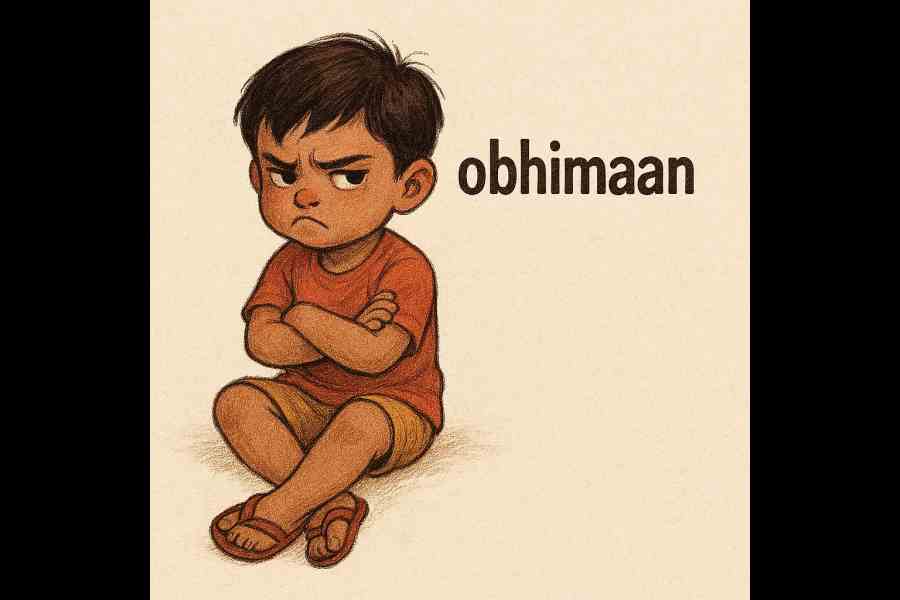Mutual enrichment
Sir — Some words elude translation — think of the Bengali word, obhimaan, for instance. No English word can capture the range of emotions contained in it. Therefore, the inclusion of untranslatable words, such as ‘gigil’ and ‘alamak’, in the Oxford English Dictionary serves as a timely reminder of the richness brought about by linguistic exchange. Languages have never existed in isolation; they are shaped by centuries of contact, adaptation, and borrowing. Attempts to preserve so-called purity in language overlook this fundamental truth. Each borrowed word offers insight into different ways of seeing and feeling, thereby enriching rather than diminishing the host language. Language thrives not through isolation, but through connections.
Pinaki Roy,
Calcutta
Strange logic
Sir — The Delhi High Court’s remarks about Wikipedia are curious — if people take it as gospel, perhaps the solution is not censorship but better media literacy. Demanding editors’ identities and threatening to block Wikipedia are extreme steps. Wikipedia is not gospel; nor does it claim to be. It is a patchwork of attributed knowledge stitched together by volunteers armed with hyperlinks and good intentions. Unlike newspapers or scientific journals, the encyclopedia does not purport to publish new information;
volunteers are instead expected to repeat with attribution or reproduce with references information originally published elsewhere, with a preference for reputable sources. In this light, the court order is problematic.
Melville X. D’Souza,
Mumbai
Sir — Censorship is the sincerest form of flattery. The Delhi High Court’s fear that Wikipedia might be mistaken for gospel truth does not make sense in a country where WhatsApp forwards enjoy near-scriptural status. If every opinion sourced from editorials is to be outlawed, one wonders how much of public discourse would survive. The real danger is not volunteers editing pages, but institutions editing truth to suit themselves. Wikipedia may not be perfect but it is one of the few places left where nuance still gets a foot in the door. Blocking it would be akin to burning down a library because someone scribbled in the margins.
Sravana Ramachandran,
Chennai
Sir — Threatening to block Wikipedia because it upset a news agency is like threatening to shut down the internet because someone left a bad review. An encyclopedia that lives and breathes with public participation seems to have disturbed the powerful. If only Wikipedia editors had remembered the first rule of Indian public life — opinions are free, but only until someone important disagrees.
Vinay Asawa,
Howrah
Sir — Wikipedia is built by volunteers who edit for free, cite sources, and sometimes even argue over the correct spelling of ‘colour’. That such a chaotic, collaborative marvel should be seen as a threat says more about the fragility of institutional egos than the platform’s accuracy.
Tapomoy Ghosh,
East Burdwan
Night shift
Sir — The recent overnight session of Parliament was notable not merely for its length but for what it revealed about the state of democratic engagement. The urgency in members’ speeches reflected political calculation as much as conviction. Meanwhile, the press operated under its own pressures, often distanced — both literally and figuratively — from the proceedings. Historical context shows how hard-won this access is for the press. Yet, the creeping restrictions are undeniable.
Tharcius S. Fernando,
Chennai
Sir — Parliament sitting past midnight may impress some but productivity measured by hours does not always equal impact in reality. Theatrics, misplaced literary references and poetic ministers added flair to the marathon parliamentary session, but little clarity was found on policy matters. Still, there remains value in such visible processes of democracy. Better a noisy night than a silent chamber.
Jahar Saha,
Calcutta
Wide gap
Sir — The Future of Jobs Report 2025 and the QS World Future Skills Index underscore a critical mismatch between India’s workforce potential and its actual preparedness. While India ranks highly in identifying future skills, it struggles to deliver them. This gap reflects a systemic need for curriculum reform, industry-academia collaboration, and investment in research and infrastructure. The emphasis on analytical, technological, and green skills must be matched by practical, inclusive implementation. Higher education must foster innovation, adaptability, and resilience through interdisciplinary learning. Only with coordinated, long-term efforts can India truly equip its youth to thrive in a dynamic global economy.
V. Jayaraman,
Chennai
Dangerous world
Sir — The United Kingdom’s legislative initiative against Artificial Intelligence-generated child sexual abuse material is a necessary and commendable step in confronting emerging technological threats. As AI tools evolve, so must legal frameworks. India’s current laws remain limited in scope, particularly when addressing AI-generated imagery. This creates significant enforcement gaps. Replacing outdated definitions, expanding intermediary liability, and aligning with global standards are essential needs. The upcoming Digital India Act presents a crucial opportunity. Protecting children in the digital age demands proactive governance, not reactive legislation. The time to future-proof the law is now. The protection of children must not remain hostage to bureaucratic inertia or reactive policymaking. Time
and innocence are both running out.
Debaprasad Bhattacharya,
Calcutta










